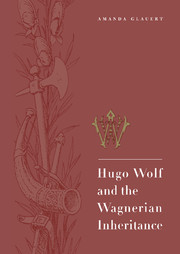Book contents
- Frontmatter
- Contents
- Acknowledgements
- Introduction
- 1 ‘Music of the future’? The nature of the Wagnerian inheritance
- 2 ‘Wagner of the Lied’? Wolf as critic of Wagner and Wagnerism
- 3 Small things can also enchant us – Wolf's challenge to nineteenth-century views of song
- 4 ‘Poetry the man, music the woman’? Wolf's reworking in his Mörike songs of Wagner's aesthetics of words and music
- 5 The integrity of musical language – questions of form and meaning in Wolf's Goethe songs
- 6 The Wolfian perspective – comparisons with the songs of Strauss and Mahler
- Notes
- Bibliography
- Index
4 - ‘Poetry the man, music the woman’? Wolf's reworking in his Mörike songs of Wagner's aesthetics of words and music
Published online by Cambridge University Press: 31 October 2009
- Frontmatter
- Contents
- Acknowledgements
- Introduction
- 1 ‘Music of the future’? The nature of the Wagnerian inheritance
- 2 ‘Wagner of the Lied’? Wolf as critic of Wagner and Wagnerism
- 3 Small things can also enchant us – Wolf's challenge to nineteenth-century views of song
- 4 ‘Poetry the man, music the woman’? Wolf's reworking in his Mörike songs of Wagner's aesthetics of words and music
- 5 The integrity of musical language – questions of form and meaning in Wolf's Goethe songs
- 6 The Wolfian perspective – comparisons with the songs of Strauss and Mahler
- Notes
- Bibliography
- Index
Summary
When late nineteenth-century critics found themselves faced with the often unnerving challenge of Wolf's music, applying Wagner's aesthetic formula – ‘poetry is the man, music the woman’ – offered them an immediate way of making sense of the impact of his songs. While acknowledging that it was hard to trace the logic of Wolf's harmonies, or identify a consistent stylistic character in his music, they could agree that such difficulties were serving poetry and bringing individual poems to life.
And this, for some, was the only critical appreciation they thought Wolf needed. The stories abound from first-hand observers, such as Hermann Bahr and Friedrich Eckstein, of how the composer would immerse himself in particular poems, and then write his settings with lightning speed, as though ‘inspired’. With such a view, it seemed inappropriate to critics to question how the composer's interpretations arose, it was sufficient to value the poetic end result. In one of the earliest articles on Wolf's songs, Josef Schalk's ‘Neue Lieder, neues Leben’ of 1890, the writer stressed the ‘naturalness’ of Wolf's music and how it appeared as a spontaneous bloom from the ‘roots’ of German folk-art. Wolf's music and the poetry were ‘destined’ for each other, as in folk-song, as in Wagnerian music drama, and clearly any notion of artistic calculation must not be allowed to disturb such a ‘love-bond’.
- Type
- Chapter
- Information
- Hugo Wolf and the Wagnerian Inheritance , pp. 48 - 78Publisher: Cambridge University PressPrint publication year: 1999



